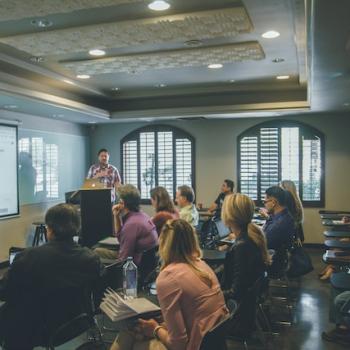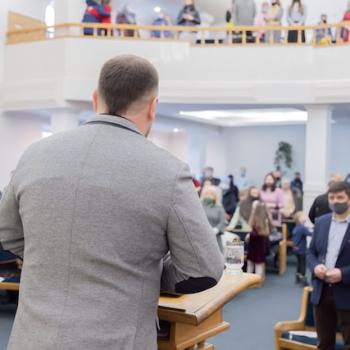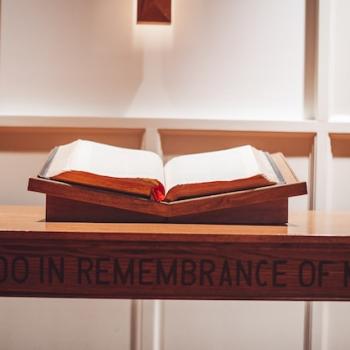A couple years back, when I was still pretty new at my current church, my pastor called me up and asked if I wanted to lead a short-term small group. I said I’d think about it.
I thought about it. And it seemed pretty clear that the answer should be “no, thanks.”
I’ve led lots of small groups before, and I’ve often enjoyed it. But I just didn’t have the energy for it at that time. The responsibility felt more stressful than life-giving. But I was reluctant to say “no.”
Saying “no” can be hard. We worry about disappointing people, about letting people down, about inconveniencing people, about what people will think of us.
It was what I needed to do. But that didn’t mean it was easy.
Good Leaders Want Us to Say “No”
When I finally called my pastor back and told her what I was thinking, she said something like this: “Good. Thanks for letting me know. I wouldn’t want this to be stressful! I just wanted to see if it was something you wanted to do, and it’s totally fine that you don’t right now.”
This response was totally right, and totally healthy. It was also a little surprising to me. After all, I’ve spent some time in higher-pressure (read: not un-cult-like) religious environments that made me feel like the more religious stuff I did—the more churchy things I said “yes” to—the better a Christian I was.
I’m so glad not to be a part of these environments anymore. Because, I’ve realized, good leaders want what’s best for us. And they trust our judgment about what that is.
Good leaders are glad to hear a “no.” They want our honesty, not our unthinking “yes.” They want us to be thoughtful about the choices we make. And they want us to let them know what we’re really thinking—not what we think they want to hear.
Saying “No” to Small Things Helps Us Say “No” to Bigger Things
In the grand scheme of things, whether or not I led a short-term church small group was not a huge deal. If I had said “yes” against my better judgment, it probably would have been fine.
I might have felt a little stressed about it; I might have felt like I took on a few too many things for a few weeks. But it would have been okay. I’m sure there are things about it that I would have enjoyed. Some good things probably would have come of it.
Leading a small group was not a bad thing in itself. It was just something I needed to say “no” to in that moment.
But saying “no” to small things like this is important, because it helps us build the capacity to say “no” to bigger things. It helps us build our “no” muscle, if you will.

Not unlike a quad or bicep, this “no” muscle is better developed in some of us than others. Some people seem to have an easier time saying “no.” But many of us find it difficult—especially those of us who, often because of race and/or gender, are societally assumed to always be willing to take on more, to sacrifice our time, to spend our energy in ways others want us to spend it.
Learning to say “no” is the flip side, in a sense, of learning to authorize ourselves. It can be hard. But it’s so important.
Some Big Things That Deserve Our “No”
I recently read and enjoyed biblical scholar Wil Gafney’s take on the often-confusing biblical book of Daniel: Strategies of Resistance: A Lesson from Daniel.
Reflecting on Daniel’s three friends’ refusal to worship the king’s statue (see Daniel 3 for the whole gnarly story), Gafney writes this: “They didn’t really strategize. They just said no. No to the god of empire. No to its worship and veneration. They didn’t negotiate; they didn’t equivocate.”
I appreciate that. Sometimes we might worry that we have to say “no” in just the right way, so as not to burn bridges. We try hard not to offend. But sometimes it’s as simple as just saying “no.” (And letting others take responsibility for their own reactions to us when we do.)
The “no” that Gafney writes about is much higher stakes than my “no” to small group leading. It’s about worship. And it’s about empire—about our relationship to the colonizing and controlling powers-that-be in our world.
It isn’t just “I don’t really have time for this,” or “this feels like it would be stressful.” It’s more, “this is wrong.” “I cannot do this and maintain my integrity.” “This goes against my values, to the core of who I am.”
The stakes are high, but the method is simple. As D.A.R.E. taught many of us, “just say ‘no.’”
Gafney goes on to name some of these high-stakes, crucial “no”s in our world today:
“Sometimes we just need to say no to the manifestations of empire in our world. No to the slaughter of school children. No to military grade weaponry in the streets. No to families ripped apart by militarized immigration assault troops. No to bad preaching. No to death-dealing theology. No to violence against women. No to bullying gay and trans teens to death. No to incompetent and corrupt government. No to everything that stands against the life-giving love of God and the liberty it grants. No and hell no.”
Amen to that. All of it.
May we build our “no” muscles in small ways, so that we can use them in big ways. No and hell no, indeed.












